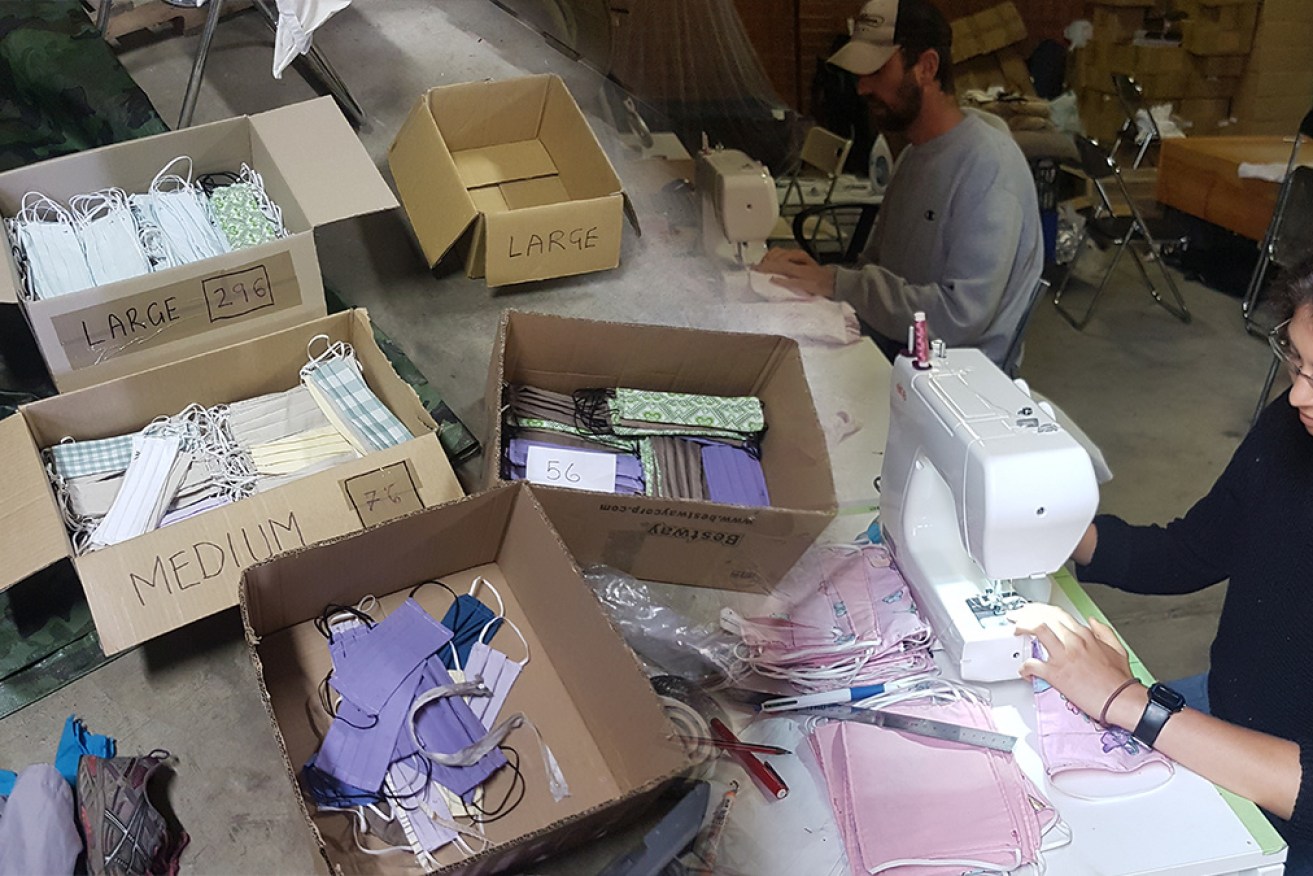COVID-19: Makeshift factory’s homemade masks have top medicos sounding the alarm


Homemade face masks are being made in bulk by one Melbourne family and some volunteers. Photo: Dave McKay/TND
Children in lockdown are making hundreds of reusable face masks from second-hand cotton sheets. They hand them out for free to elderly Australians queuing outside supermarkets.
While they mean well, experts warn that homemade masks have the potential to cause harm.
Dave McKay has turned his home garage into a mask-making factory. His three grandchildren, all aged 12, help six adults, cut and stitch the op-shop material with elastic strips, to replicate surgical face masks that cover the mouth and the nose.
“Elderly people standing in a queue outside the supermarkets would put the masks on straight away and wear them while shopping inside,” Mr McKay said.

The team makes about 130 masks per day. Photo: Dave McKay
Supermarkets aren’t always welcoming. On Friday, one of Mr McKay’s young distributing teams was kicked out of a Woolworths store in Melbourne.
The store manager apparently complained that homemade masks were dangerous and that the container used to store them was not sterile.
Mr McKay conceded “it was obviously very clean, but certainly not sterile” and “the moment anyone touched a mask it would not be sterile anyway”.
The masking team of volunteers is pressing on regardless. They have already made 750 reusable masks and have enough material for 1250 more.

Mr McKay’s wife taught their grandchildren how to sew. Photo: Dave McKay
“While medical staff are the ones at most risk, it makes no sense to say that masks do not help members of the general public,” Mr McKay said.
“Hand-washing is the best means of defence, but it does not mean that hand-washing plus masks is not better.”

Second-hand sheets and spools of thread were also bought from Salvos and Vinnies stores. Photo: Dave McKay
He referred to an article by The Atlantic which reported that studies have suggested homemade cloth masks, while less effective than medical ones, were still better than nothing.
The article referenced a 2013 experiment, that found surgical masks filtered 89 percent of viral particles from the air.
“That is where we are coming from,” Ms McKay said.
According to the report, the aim of the experiment by Cambridge University was “to determine the effect of homemade and surgical masks in preventing the dispersal of droplets and aerosol particles produced by the wearer”.
Associate Professor Ben Mullins, from the School of Public Health at Curtin University, told The New Daily that the researchers didn’t investigate what was inhaled by participants, and thus failed to demonstrate that surgical masks will protect people from contracting the coronavirus.
Associate Professor Mullins said that surgical masks are not designed to protect the wearer but to prevent them from contaminating others: they catch droplets emitted while exhaling.
This is important in hospital settings – but a person donning a surgical mask is still inhaling air through its unenclosed sides, meaning infected droplets may still enter their system.

About $1000 have been spent on supplies. Photo: Dave McKay
Associate Professor Mullins questioned the idea they were still “better than nothing” by raising concern for people wearing homemade masks who are infected, coughing persistently and exhaling lots of droplets.
“If it’s not maintained very well, if they’re wearing the same homemade mask for days and days, you can get such a buildup of moisture on there that it can be a vector for disease,” he said.
Associate Professor Brian Oliver, a respiratory specialist at the University of Technology Sydney, worries that the masks, depending on the thickness of the cotton, could be hazardous to elderly people with breathing problems.
He is also concerned that homemade masks can give a false sense of security and cause people to take more risks because they mistakingly believe the face-covering will protect them.








